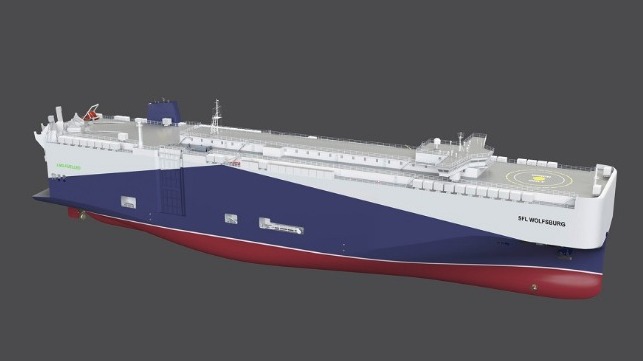
On the same day as the European Commission’s announcement of its decarbonization plans for shipping, including the status of LNG as a transition fuel, German carmaker Volkswagen announced that it is chartering four more newbuild LNG-powered car carriers.
Each year, Volkswagen loads 2.8 million new cars on ro/ros for delivery, using chartered space on hundreds of vessels making about 7,700 total departures from ports around the world. The company charters eleven car carriers for its own full-time use.
When delivered and added to its current roster of two LNG-powered ro/ros, the vessels will make VW the first automaker to transport most of its overseas sales using LNG, the company said. All four should be in service by the end of 2023, and they will be deployed on its North American service for deliveries between Germany and Veracruz, Mexico (and points between). On the return trip, the LNG-fueled ships will transport new vehicles destined for Europe. Their engines will be high-pressure injection models with no methane slip.
“In line with the Group’s commitment to e-mobility and climate-neutral production, the LNG fleet . . . represents a major contribution to making Volkswagen net carbon neutral by 2050,” said Simon Motter, Head of Volkswagen Group Logistics. “The new ships will also permit the use of non-fossil fuels in the future, thus reducing CO2 emissions even further.”
VW says that the switch to LNG is consistent with its climate goals. In Germany, the group has already switched all rail transport with Deutsche Bahn to green electricity, and it is extending this to transport throughout Europe. On coastal routes, the group already operates two car carriers with biofuel produced from plant-based residues, including waste oil from the food industry. The company estimates that its biofuel-powered voyages yield an 85 percent reduction in CO2 emissions on a well-to-wake basis.
SOURCE READ THE FULL ARTICLE
https://www.maritime-executive.com/article/vw-becomes-first-automaker-to-ship-most-overseas-exports-using-lng